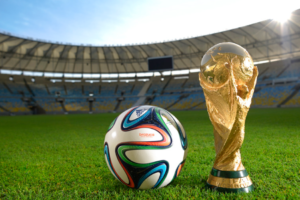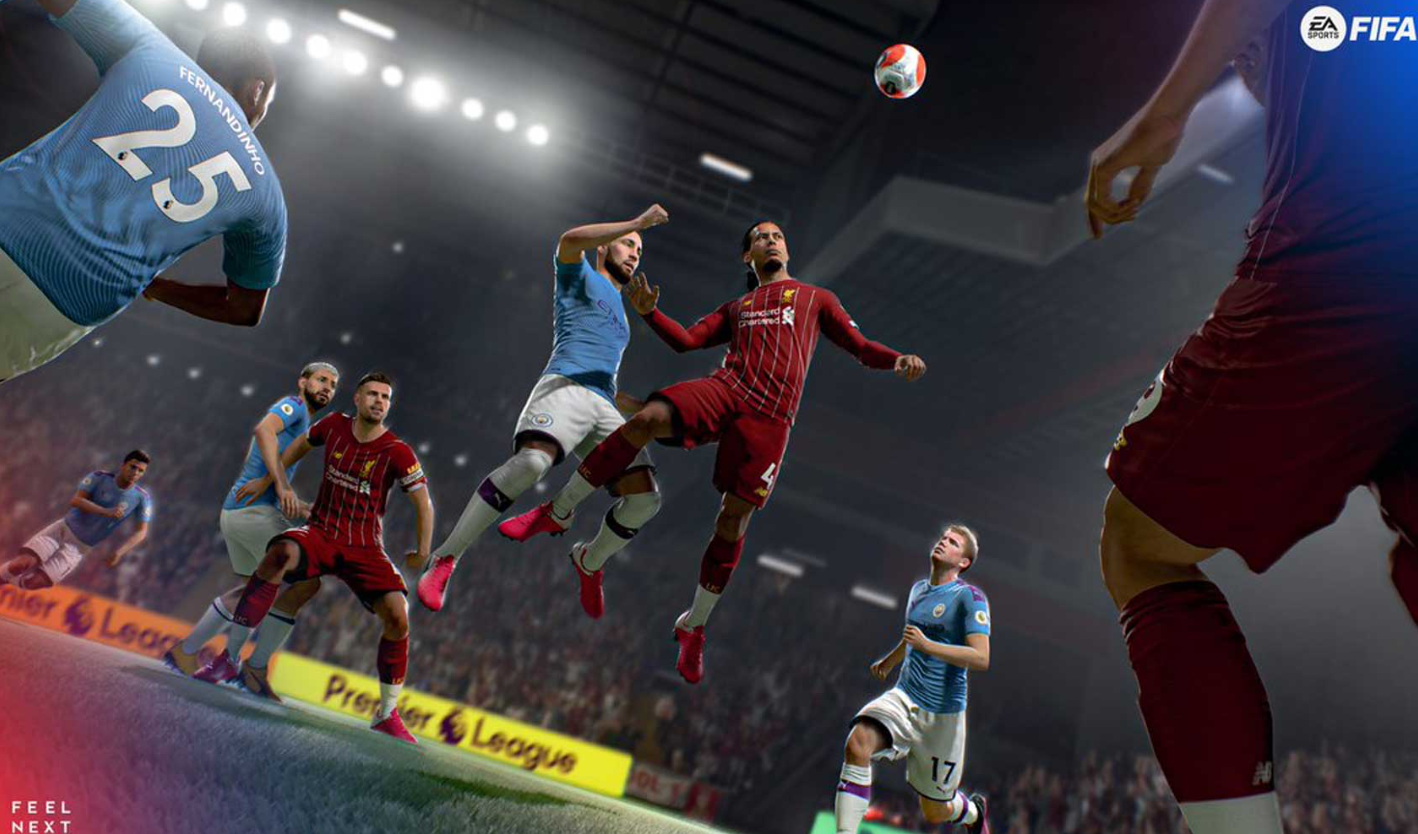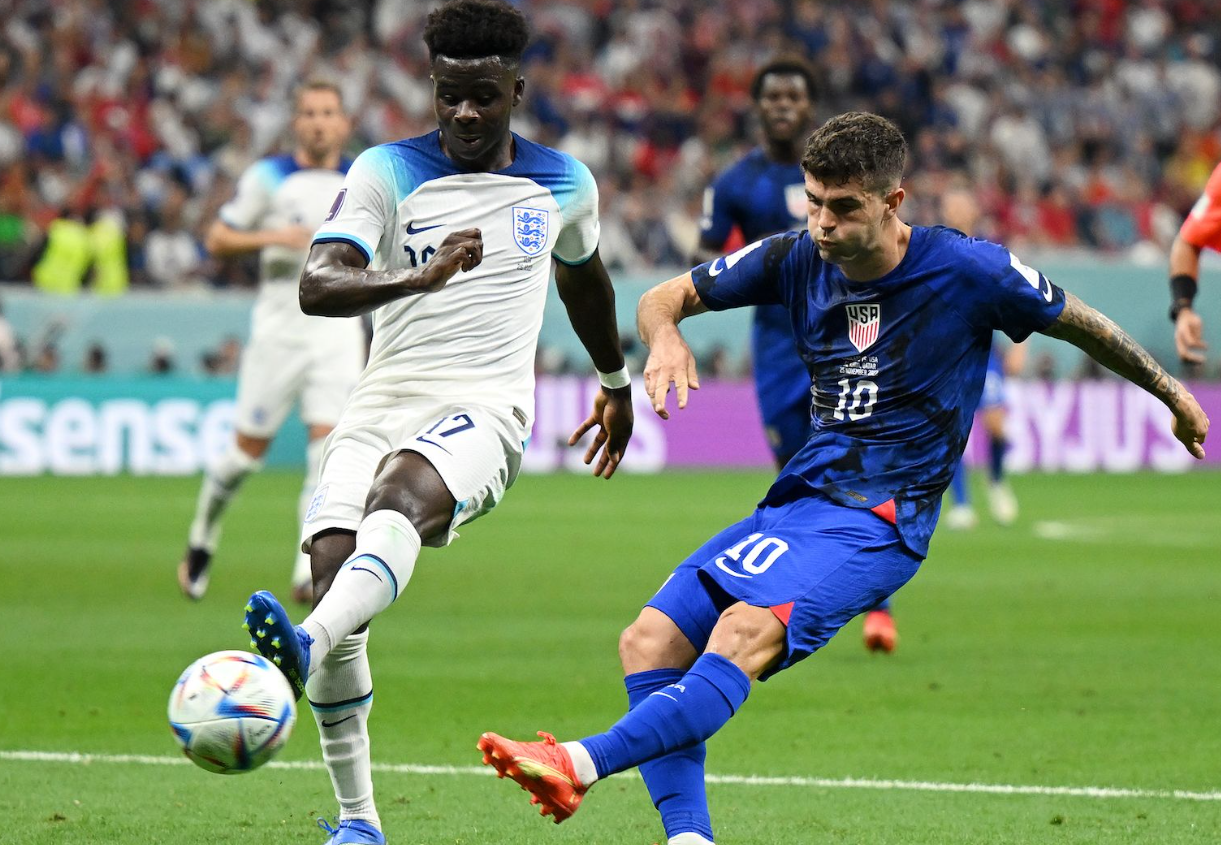FIFA video games have become a global sensation, captivating football enthusiasts of all ages. These virtual simulations offer a unique opportunity for players to step into the shoes of their favorite football stars and experience the thrill of the beautiful game from the comfort of their homes.
With each new installment, FIFA video games strive to provide a more realistic and immersive experience. The developers meticulously recreate the stadiums, players’ faces, and even the crowd chants. This attention to detail makes it feel like you are genuinely part of the action, enhancing the overall gaming experience.
One of the most exciting aspects of FIFA video games is the ability to compete against friends or fellow gamers online. Whether it’s a friendly match or a high-stakes tournament, the competitive nature of these games brings people together from different corners of the world, fostering a sense of community and camaraderie.
Moreover, FIFA video games offer a platform for players to showcase their skills and creativity. Players can devise unique strategies, execute breathtaking goals, and even create their own dream teams. The game’s mechanics allow individuals to explore different playstyles and experiment with various tactics, adding an extra layer of excitement to the gameplay.
Furthermore, FIFA video games serve as a gateway to the world of professional football. Many young players have been inspired by these games to pursue a career in the sport. By virtually managing teams, negotiating transfers, and experiencing the ups and downs of football management, players can gain insights into the complexities of the sport and develop a deeper appreciation for it.
In conclusion, FIFA video games have revolutionized the gaming industry, providing players with an unparalleled football experience. From realistic graphics and online competitions to fostering a love for the sport, these games have captured the hearts of millions worldwide. So grab your controller, choose your favorite team, and embark on a virtual football journey like no other.

FIFA World Cup Games
The FIFA World Cup Games, a pinnacle of international football, have captivated audiences around the globe for decades. This grand event brings together the best teams from across the world to compete for the coveted title of world champions. The World Cup Games are an unparalleled celebration of the beautiful game, showcasing the extraordinary talent, passion, and camaraderie that exists within the realm of football.
Every four years, the world holds its breath as the tournament unfolds, with each match offering a glimpse into the sheer brilliance and skill of the players. The World Cup Games have given us countless memorable moments that will forever be etched in football history. From Diego Maradona’s sublime “Hand of God” goal to Zinedine Zidane’s unforgettable headbutt, these moments have become ingrained in the collective memory of football enthusiasts.
The World Cup Games have also transcended the boundaries of sport, uniting people from diverse cultures, backgrounds, and languages. During this month-long extravaganza, fans from all walks of life come together, proudly donning their national colors, waving flags, and chanting anthems with unwavering passion. The tournament creates a unique sense of camaraderie, allowing individuals to forge connections and friendships that extend far beyond the football pitch.
Moreover, the World Cup Games provide a platform for countries to showcase their distinct footballing philosophies and styles of play. Each team brings its own brand of football, reflecting their cultural heritage and national identity. From the flamboyant samba style of Brazil to the tactical precision of Germany, the World Cup Games offer a veritable feast of footballing ideologies, ensuring that there is something for everyone to appreciate and admire.
Beyond the on-field action, the World Cup Games have a profound impact on the host nation. The tournament brings with it a surge of economic activity, as thousands of spectators flock to the host country, providing a boost to local businesses and tourism. The World Cup Games present an opportunity for nations to showcase their rich history, vibrant culture, and breathtaking landscapes to a global audience, leaving a lasting legacy long after the final whistle has blown.
In addition, the tournament serves as a catalyst for social change and development. FIFA, the governing body of world football, invests heavily in infrastructure projects and grassroots football development in the host nation. This investment ensures that the World Cup Games leave a positive and lasting impact, providing opportunities for aspiring young footballers to hone their skills and fulfill their dreams.
The World Cup Games are not just about the victories and defeats on the pitch; they are about the stories that unfold throughout the tournament. From underdogs defying the odds to emerging talents announcing their arrival on the world stage, the World Cup Games provide a stage for dreams to come true. These games inspire generations of footballers, instilling in them the belief that anything is possible with determination, hard work, and talent.
As the final whistle of each World Cup Games echoes across stadiums worldwide, the memories created during this month-long extravaganza linger in the hearts and minds of football fans for years to come. The tournament represents the epitome of footballing excellence, showcasing the very best that the sport has to offer. It is a celebration of unity, passion, and the universal language of football that unites us all.
In conclusion, the FIFA World Cup Games are a testament to the power of the beautiful game to transcend boundaries and bring people together. This grand tournament showcases the pinnacle of footballing excellence, leaving an indelible mark on the hearts and minds of fans across the globe. The World Cup Games are a celebration of talent, passion, and the unifying spirit of football that continues to captivate the world with each edition.
FIFA International Football Matches
FIFA International Football Matches: Celebrating the Global Game
Football, also known as soccer, is a sport that transcends borders, languages, and cultures. It brings people together, uniting nations in a shared love for the game. FIFA international football matches are a testament to this global phenomenon, providing a platform for players to showcase their skills and represent their countries on a grand stage.
FIFA, the Fédération Internationale de Football Association, is the governing body for international football. It organizes various tournaments and competitions, including the FIFA World Cup, which is the pinnacle of football excellence. Nations from all corners of the globe compete against each other, showcasing their unique style of play and creating a sense of national pride.
These international football matches are not just about the game itself; they carry immense cultural significance. When a national team steps onto the field, they are representing their country and its people. The players become ambassadors, showcasing their nation’s values, traditions, and way of life. Through the game, spectators get a glimpse into the diverse tapestry of the world, celebrating both differences and similarities.
The FIFA World Cup is held every four years and is undoubtedly the most prestigious tournament in international football. It brings together teams from 211 member associations, creating an atmosphere of excitement and anticipation among fans worldwide. The tournament captures the attention of billions, uniting people from different backgrounds in support of their favorite teams.
These international matches provide a platform for players to achieve greatness. They offer an opportunity to showcase their skills and leave a lasting impact on the world of football. Legends such as Pelé, Diego Maradona, and Cristiano Ronaldo have all graced these international stages, etching their names into football history. The matches inspire aspiring players, motivating them to dream big and pursue their passion for the game.
Furthermore, FIFA international football matches are not only about the players but also the fans. The tournament atmosphere is electric, with passionate supporters from all over the world chanting, waving flags, and wearing their national colors. The camaraderie and enthusiasm displayed by these fans symbolize the unity that football can bring, breaking down barriers and fostering a sense of global community.
The impact of these matches extends beyond the field. Hosting a FIFA tournament brings economic and social benefits to the host nation. It boosts tourism, stimulates local businesses, and promotes infrastructure development. Moreover, it provides an opportunity for the host country to showcase its culture, history, and natural beauty to a global audience, leaving a lasting impression on visitors from around the world.
In recent years, FIFA has also made efforts to promote inclusivity and diversity through international football matches. The Women’s World Cup has gained significant momentum, shining a spotlight on women’s football and inspiring a new generation of female players. These matches provide an avenue for female athletes to showcase their talent and challenge societal norms, paving the way for a more equitable future in the sport.
In conclusion, FIFA international football matches carry immense significance, uniting nations, and celebrating the beautiful game. They provide a stage for players to showcase their skills and represent their countries, inspiring millions around the world. These matches foster a sense of global community, breaking down barriers and promoting inclusivity. The impact of these tournaments extends beyond the game itself, providing social and economic benefits to host nations. Football truly is a global language, and FIFA international matches allow us to celebrate the diversity and unity that the sport brings.

FIFA Official Competitions
FIFA Official Competitions: Celebrating the Beautiful Game
The pinnacle of football excellence, FIFA official competitions bring together the finest teams and players from around the globe. These prestigious tournaments showcase the passion, skill, and camaraderie that make football the most beloved sport in the world. From the thrilling FIFA World Cup to the electrifying FIFA Club World Cup, these events captivate millions, uniting fans across borders and cultures.
The FIFA World Cup, held every four years, stands as the ultimate testament to football’s global appeal. National teams from six confederations battle it out over a month-long extravaganza, with only one emerging as the world champion. The tournament’s rich history is filled with unforgettable moments, from Diego Maradona’s “Hand of God” goal to Zinedine Zidane’s majestic headbutt. The World Cup transcends sport, becoming a cultural phenomenon that fosters unity and pride among nations.
In addition to the World Cup, FIFA organizes various continental championships, such as the UEFA European Championship and the Copa America. These tournaments provide a platform for regional powerhouses to showcase their talents and compete for continental glory. The European Championship, for instance, has witnessed fierce rivalries between nations like Germany and Italy, Spain and Portugal, igniting the imagination of football enthusiasts across Europe.
While national teams battle for supremacy, club teams also have their moment in the spotlight with the FIFA Club World Cup. This annual competition features the champions from each confederation, along with the host nation’s champion, competing for the title of the world’s best club team. The Club World Cup brings together footballing giants like Barcelona, Bayern Munich, and River Plate, providing an opportunity for them to showcase their prowess on a global stage. The tournament unites fans from different leagues, allowing them to witness thrilling clashes between teams they may never have seen face off otherwise.
FIFA also recognizes the importance of developing football at the youth level. The FIFA U-20 and U-17 World Cups provide young players with a chance to shine and gain invaluable experience. These tournaments often serve as a stepping stone for future stars, with the likes of Lionel Messi, Neymar, and Kylian Mbappé having honed their skills in these competitions. Watching these young talents blossom on the international stage is a joy for fans and a testament to FIFA’s commitment to nurturing the game’s future.
Beyond the excitement on the pitch, FIFA official competitions leave a lasting impact on host nations. The tournaments bring economic benefits, attracting tourists and boosting local businesses. The infrastructure developed for these events often leaves a legacy, benefiting communities long after the final whistle has blown. Moreover, the sense of national pride and unity that these competitions generate is immeasurable, fostering a sense of belonging among citizens and leaving a lasting legacy of joy and camaraderie.
FIFA official competitions are not just about the game; they are about celebrating the beautiful sport of football and the values it represents. From the roaring stadiums to the millions of fans watching from home, these tournaments create a global community of football enthusiasts. They bridge divides, create lifelong memories, and inspire generations to come. FIFA’s dedication to organizing and promoting these competitions has made it the guardian of the world’s most popular sport and a driving force behind its continued growth and universal appeal.
FIFA Laws and Regulations
FIFA, an acronym that resonates with football enthusiasts across the globe, stands for the Fédération Internationale de Football Association. This international governing body of association football, futsal, and beach soccer, has been instrumental in shaping the beautiful game we all love. Through its comprehensive set of regulations, FIFA ensures that the sport is played in a fair and competitive manner.
One of the fundamental aspects of FIFA’s regulations is the requirement for players to be eligible to represent a particular national team. These regulations aim to maintain the integrity of international football competitions. To be eligible, a player must either be born in the country they wish to represent or have a parent or grandparent who was born there. This criterion helps prevent the exploitation of national team eligibility for personal gain.
Furthermore, FIFA regulations also govern the transfer of players between clubs. These regulations aim to ensure that the transfer market operates in a fair and transparent manner. Clubs are required to follow certain procedures when signing players, such as obtaining the player’s consent and adhering to specific timelines. This helps prevent unethical practices and ensures that players have a say in their own careers.
Another crucial aspect of FIFA’s regulations is the protection of intellectual property rights. FIFA understands the significance of protecting the commercial value of the sport and its associated branding. Therefore, the unauthorized use of FIFA’s logos, emblems, and trademarks is strictly prohibited. This ensures that the FIFA brand remains exclusive and upholds its reputation as the global authority in football.
Moreover, FIFA regulations also cover the conduct of players and officials during matches. Players are expected to adhere to a code of conduct and display good sportsmanship. This includes respecting the decisions of referees, not engaging in unsporting behavior, and avoiding any actions that may bring the game into disrepute. These regulations promote fair play and contribute to the positive image of football.
In addition to player conduct, FIFA also regulates the use of technology in football. The introduction of Video Assistant Referee (VAR) technology has been a significant development in recent years. VAR allows referees to review decisions using video footage, enhancing the accuracy and fairness of match outcomes. FIFA’s regulations ensure that VAR is implemented consistently across different competitions, maintaining uniformity and preventing any potential misuse.
Furthermore, FIFA’s regulations extend to the safety and security of players, officials, and spectators. The governing body mandates certain safety measures to be in place at stadiums, such as proper crowd control and emergency response procedures. These regulations aim to create a secure environment for all involved in the game, prioritizing their well-being.
FIFA’s regulations also address issues related to anti-doping. The use of performance-enhancing substances is strictly prohibited in football, as it undermines the fairness and integrity of the sport. FIFA conducts regular drug tests on players to ensure compliance with anti-doping regulations. This commitment to clean sport helps protect the health of athletes and maintains a level playing field.
Lastly, FIFA’s regulations encompass financial matters, including the governance of football clubs and the management of finances within the sport. These regulations aim to prevent financial mismanagement, ensuring the long-term sustainability of clubs and leagues. By promoting financial transparency and accountability, FIFA contributes to the overall stability of football as an industry.
In conclusion, FIFA’s laws and regulations govern various aspects of the beautiful game, ranging from player eligibility to conduct during matches, and from the use of technology to financial governance. These regulations form the backbone of fair play, integrity, and the overall development of football as a global sport. By upholding these regulations, FIFA ensures that the game we all cherish continues to thrive for generations to come.











